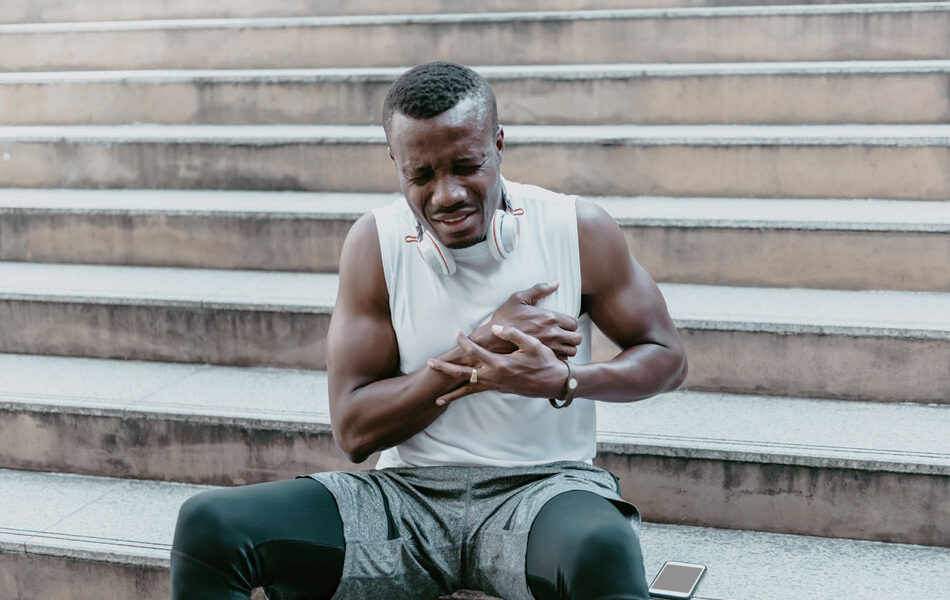Does Anxiety Cause Chest Pain? Discover the Relation
Feeling anxious can cause a range of physical symptoms. One of these might be chest pain and other uncomfortable feelings in the body. We explain the link between anxiety and chest pain, including 5 ways you can relieve the horrible tightness in your chest.

People with anxiety may experience both psychological and physical symptoms.
One of these distressing symptoms may be chest pain or tightness. Changes in your hormone levels and breathing patterns may put additional stress on your lungs.
Severe anxiety is bound to cause negative physical effects. This is why you should learn more about stress and how to reduce the chest pain that comes with it.
Keep on reading to learn more about anxiety-related chest pain.
Does Anxiety Cause Chest Pain?
Yes, anxiety can cause chest pain for some people. Being stressed may change your breathing pattern and put extra strain on the lungs or chest muscles. Plus, high anxiety levels can raise blood pressure and increase your heart rate throughout the day.
One study found that being anxious increases cortisol – a stress hormone that negatively impacts your heart. This hormone especially triggers blood pressure spikes and heart palpitations, which are two things that contribute to chest pain or shortness of breath.
Not many people understand the body’s response to anxiety symptoms. You immediately tense up when dealing with negative emotions or thoughts. Feeling tense increases muscle tension in your chest, as you’re constantly trying to regulate your breathing in times of sudden panic.
You might also get shoulder and neck pain from anxiety disorders. This can be accompanied by chronic migraines, sweating, stomach cramps, and fatigue. If you do experience sudden chest pain symptoms, consult with a medical professional about getting the right treatment.
What Does Chest Pain From Anxiety Feel Like?
Chest pain from anxiety disorders usually feels uncomfortable. This might be pressure on the lungs or random shooting pains that cross the whole chest. Low-risk chest pain isn’t something to be worried about, but seek immediate help if the pain worsens.
Anxiety symptoms will always be different for everyone. There may be some days when you get chest pain and other days when you experience paranoid thoughts. Not every day brings uncomfortable shooting pains in your chest, but it’s important to be aware of what tight chest muscles feel like.
Research found that 25–50% of people who go to the emergency department with chest pain symptoms usually have severe anxiety. This just shows that chest pain feels unique to everyone, and there may be times when you’re afraid it’s a heart attack or cardiac chest pain.
Here are some symptoms of anxiety-induced chest pain:
- Sharp, shooting, or stabbing pain
- Dull aches
- Chest tightness
- Burning sensation
- Persistent discomfort
- Sudden pressure
- Muscle spasms or twitches
How Long Does Anxiety Chest Pain Last?
Anxiety chest pain can last anywhere from 10 minutes to seven days. The duration of this symptom depends on your stress response. Being anxious for several hours can increase the pain, while a brief anxiety attack may cause pain for only a few minutes.
Some people who have intense anxiety or panic attacks might have a sore chest. This can last for hours or days due to muscle contractions during the emotional state. Sudden unregulated breathing may confuse your lungs and put added stress on the muscles.
For those with worsening symptoms, seek medical attention right away. Chest pain accompanied by nausea, shortness of breath, and jaw pain may be a sign of a heart attack. Visit an urgent care center to ensure what you’re experiencing is just anxiety chest pain.
Can anxiety cause chest pain every day?
Yes, anxiety chest pain can be a daily occurrence for some people. This could be due to a severe panic attack that weakens the chest muscles. You may want to try deep breathing techniques, morning meditation, or regular exercise to reduce the risk of panic attacks.
An anxiety or panic attack can last anywhere between 5 and 30 minutes. During this time, your lungs and muscles go through intense pressure to regulate your breathing. The fight-or-flight response usually releases stress hormones that increase the duration of anxiety chest pain.
People with a severe anxiety disorder might have a panic attack every day. This depends on their mental health, environment, and current emotional state. Since the chest muscles don’t have enough time to rest, they are more likely to cause pain for anxiety disorder sufferers.
What Causes Anxiety Chest Pain?
During a panic attack, your brain releases adrenaline and cortisol. These hormones increase your heart rate and blood pressure. Because of this, you might experience anxiety chest pain due to shortness of breath and restricted blood flow to the lungs.
A regular anxiety attack isn’t good for your long-term health. Studies prove that chronic stress encourages high blood pressure, leading to damaged blood vessels. Plus, hyperventilating causes musculoskeletal chest pain, which triggers an onset of short esophageal spasms.
Cortisol increases blood glucose for energy, while adrenaline increases your heart rate to distribute more blood to muscles. The combination of these hormones may suddenly trigger chest pain, especially if the fear from an anxiety attack morphs your perception of pain.
Keep in mind that the symptoms of panic attacks and heart attacks are different. A heart attack gives you more intense pain that radiates into your jaw, neck, and shoulders. Panic attacks give you a dull ache that feels like you’ve accidentally strained your chest while exercising.
How to Relieve Chest Tightness From Anxiety: 5 Powerful Ways to Find Relief
There are things you can do to prevent chest pain. Some people need a healthy routine that encourages them to get out of bed and not let destructive thoughts take over. If you have regular anxiety attacks, consider seeking therapy to improve your long-term mental health.
Here are 5 ways to reduce anxiety symptoms:
#1 Start meditating
One study found that meditation could help you manage anxiety. You can push your mind into a deep state of relaxation by sitting in a quiet environment. Sit down in a comfortable position, take deep breaths, and put on calming music to help you focus on banning negative thoughts.
#2 Accept your feelings
There’s nothing wrong with accepting your feelings and finding ways to heal. Someone with anxiety or panic disorder might feel like a loser when it comes to experiencing sadness. You should understand more about your emotional thoughts and why you might be having them.
Consider talking to family members or close friends about your feelings. Opening up can be a great way of expressing your emotions about certain situations. Plus, studies have shown that social connection promotes strong mental health in those who need extra support.
#3 Try a relaxation app
Certain apps could help you find inner peace. This is suitable for people who need at-home support without going to in-person therapy sessions. Just make sure you choose an app that caters to your budget, personal needs, long-term expectations, and mental health concerns.
Look for an app with mood journaling features, quick-relief exercises for anxiety attacks, and cognitive behavioral therapy (CBT) lessons. CBT is an interesting feature because it is a form of psychological treatment. People undergo these lessons to change their long-term mindset and avoid unhealthy behaviors.
#4 Practice slow breathing
You can practice slow breathing in the comfort of your home. Sit in a comfortable chair and close your eyes to gain better focus. Take a deep breath in through your nose for 4–5 seconds, hold that breath for at least two seconds, and slowly release that air through the mouth.
You may also try to incorporate the 333 rule for anxiety which directs your attention to what you see, hear, and touch and may help you feel calmer.
Slow breathing expands your lungs and increases oxygen absorption. This ensures your chest muscles can function properly, especially in times of high stress. You can also practice this breathing technique if you have health anxiety and feel worried about a potential heart attack.
#5 See a doctor
If you’re worried about your chest pain, you should see a doctor. They can reassure you that it’s not a heart attack or offer treatment options. Some people with generalized anxiety disorder usually take medication, depending on their personal preferences and panic attack symptoms.
However, anyone who is concerned about a heart attack should seek emergency medical attention. Chest pain that radiates into your back, neck, jaw, or shoulders could be an emergency. Of course, stress can make the pain feel worse, but it’s still important to get these things checked out.
A Word From a Psychologist
Dealing with anxiety chest pain can be incredibly challenging. You might believe you’re having a heart attack that requires a trip to the emergency room. This fight-or-flight response is completely normal, but it’s important to build habits that decrease the risk of panic attacks.
People can usually tell when an anxiety or panic attack is about to start. Some signs include shortness of breath, pounding heart rate, sweaty hands, and a sense of impending doom. Looking out for these common signs could help you lower your heart rate efficiently.
There are many things you can do to reduce anxiety and chest pain. Certain breathing exercises, like breathing in through the nose and out of the mouth, could help. Even committing to morning walks may clear your head and help you focus on reinforcing positive emotions.
You should still be aware of a possible heart attack. People report heart attack pain feeling like burning and squeezing inside the chest. This discomfort also radiates to the jaw, neck, and upper arms, so always seek urgent medical attention if you experience these symptoms.
Non-cardiac chest pain means there isn’t something serious going on. Feeling anxious regularly is bound to put added stress on your chest and lungs. Avoid self-destructive behavior during times of intense anxiety and focus on creating a stable routine that is good for your health.
Conclusion
People can get anxiety-related chest pain all the time. Your body goes through abnormal hormonal and breathing changes as it tries to regulate stress. Talk to your doctor if your chest pain doesn’t go away or if you can’t get rid of the anxious feelings.

















































 Select your language:
Select your language: 








